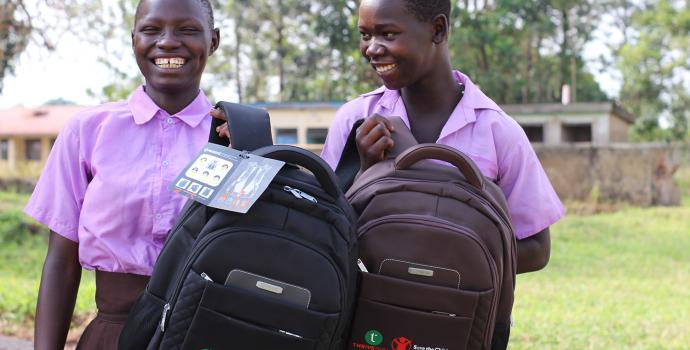Stop the war on children
In her small village in eastern DR Congo, Mangeni* had a happy life. Her parents ran a shop, she went to school, she played with her friends. Then one day, when she was 11 years old, everything changed.
“Life became hell when my father was killed,” she remembers.
Armed men entered the village and looted homes. They tied Mangeni* up, beat her mother and took her father into the forest, where they shot him.
The men blindfolded Mangeni* and took her away to their camp. For the next year she lived in terror. The group forced her to cook and clean for them, often arguing about whether to kill her. “After cooking they would beat me with sticks, step on me, and kick my ribs and stomach,” she says. “Since then my urine started coming uncontrollably.” Other children were brought to the camp and all of them were killed. “I saw many bodies.”
One night she saw a chance to escape. As the men slept, she ran into the woods. She slept in a banana plantation, where a man found her and took her home. Almost a year after she was abducted, she arrived home and her mother burst into tears from happiness. “She said she thought I was dead,” Mangeni* recalls. “I was very happy because I thought she too was dead.”
Now 13, Mangeni* lives with her mother in a refugee settlement in western Uganda. Last year alone, around 130,000 Congolese refugees fled to Uganda, which is already hosting one of the largest numbers of refugees in the world.
Life is better here, but still difficult. Mangeni* struggles with the trauma and injuries – she’s often in pain and suffers from incontinence due to the beatings she endured. “Since I arrived in Uganda life hasn’t been easy,” she says. “My mother is very ill and weak because of hypertension and what she saw in Congo, especially the killing of my father in front of her. My mother collapses whenever she remembers about my dad. My biggest worry is my mother’s deteriorating health – and my health as well.”
Mangeni* attends one of the Child Friendly Spaces (CFS) run by Save the Children in the settlements. It provides children like her with a safe place where they can play, learn, interact with other children, and get basic psychosocial support.
When she thinks of all that has happened, Mangeni* says, “it saddens me and I start crying. This is the reason why I got involved in these games (at the CFS). They help me to forget a little.”
Save the Children spoke to Mangeni* and other children like her as part of our new report called Stop the War on Children, which looks at the 10 countries where children are most affected by conflict. DR Congo and South Sudan – where most of the refugees in Uganda are from – are high on the list.
Five times more children than fighters have died in these conflict zones in the past five years. On average, every year about 175,000 children under five years old die preventable deaths in these areas. And it’s getting worse. The number of ‘grave violations’ against children – the worst crimes, such as killing and maiming, abduction and recruitment, and sexual violence – almost tripled since 2010. Most attacks are carried out with complete impunity.
The situation for children in DR Congo is desperate. Militia routinely abduct, recruit and abuse children – both boys and girls. Children are killed and made to commit atrocities on the battlefield, forced into sexual slavery and exploited. 2017 saw the highest level of verified child casualties on record, and the highest level of recruitment of child soldiers for nearly a decade.
This is the kind of horror that child refugees in Uganda are fleeing. Uganda has a progressive policy of welcoming refugees and granting them rights, and we hope this will continue. In the meantime, the country needs more support. The mass influx of refugees has put significant strain on services such as schools and health facilities, which are increasingly overwhelmed.
The international community – through agreements such as the Global Compact on Refugees and the establishment of the Comprehensive Refugee Response Framework (CRRF), of which Uganda is a pilot country – has committed to sharing the responsibility, and it’s vital that is followed through. The needs in the refugee settlements are vast and children continue to arrive every day, yet the response is severely underfunded.
Investing in multi-year education and child protection programmes, for example, is vital. Getting children like Mangeni* back into education can help them return to a sense of normalcy and have an opportunity for a better future. Yet 57% of refugee children in Uganda – as well as 34% of the local communities in the refugee-hosting districts – are out of school. Uganda recently launched a new Education Response Plan which could provide quality learning for 565,000 refugee and host community learners. Initiatives such as this need greater political support and funding.




